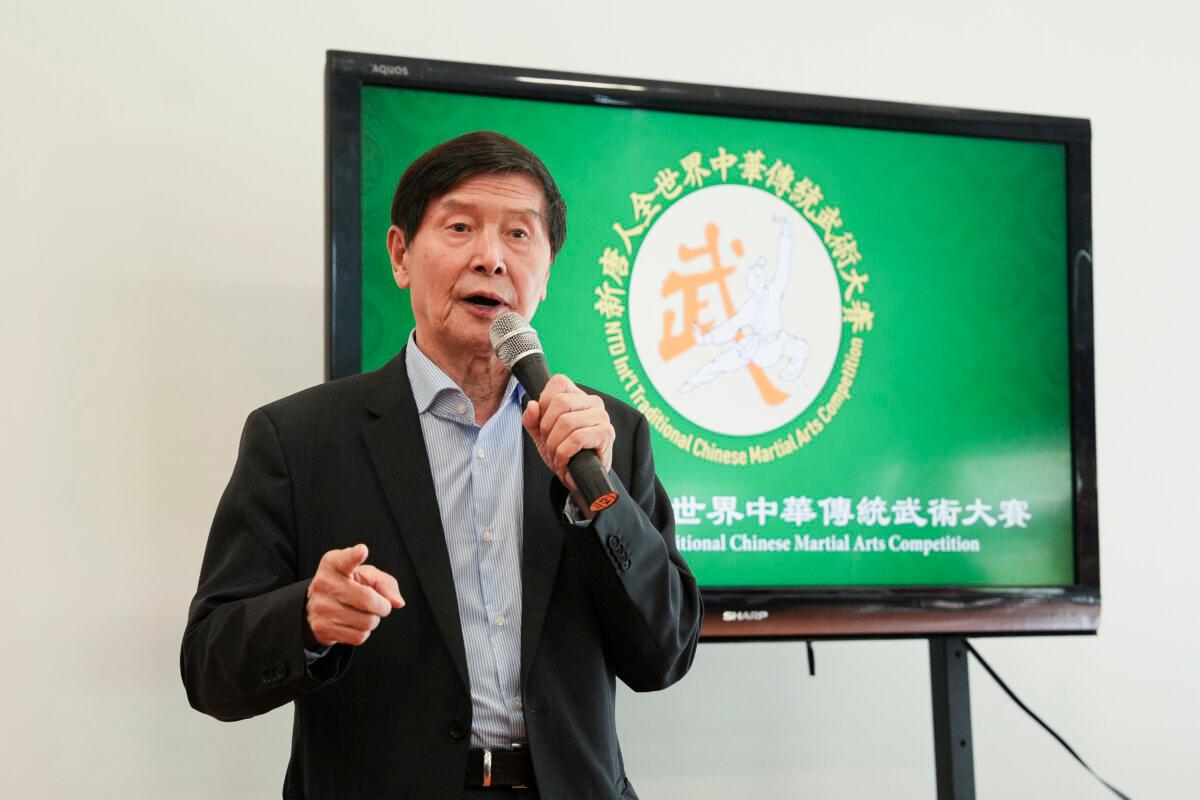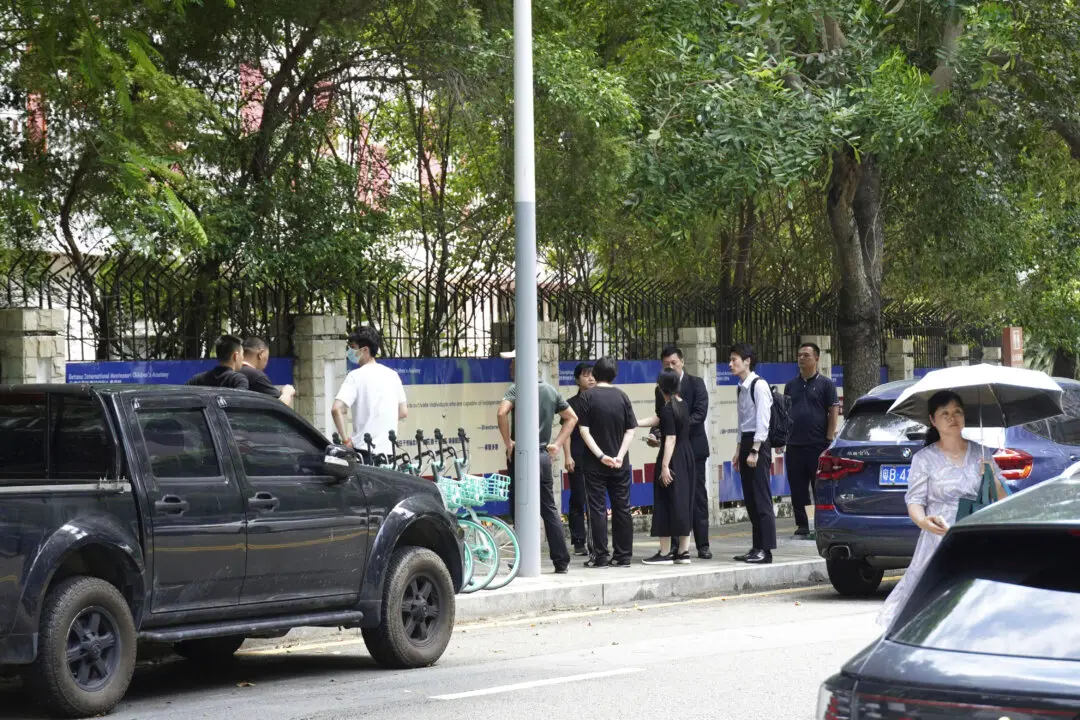Ninety-one martial artists from 10 countries joined NTD, a sister outlet of The Epoch Times, in New Jersey to compete in the 8th International Traditional Chinese Martial Arts Competition with the shared mission of reviving traditional Chinese martial arts.
The competition began on Aug. 30 with preliminary events and wraps up with finals and awards on Sept. 2.
Traditional Chinese martial arts have a history of thousands of years, and they have been passed down from a master to a chosen disciple over millennia. This ended harshly with the bloody Cultural Revolution carried out by the Chinese Communist Party (CCP), and much of what was passed through word of mouth and in practice among individuals was lost.
But some of the physical movements remain, as well as guiding principles that competition chair Li Youfu says can serve as a compass for martial artists today who try to recover the legacy meant for them to inherit.
“Martial virtue is about protecting the innocent and kind, and stopping evil,” Li said.
As advanced martial artists know, just as many top-performing athletes do, their craft goes beyond the physical, competition judges said. One’s mental state can be the determining factor for breaking through to the next level, so in prioritizing virtue as one perfects their form, martial artists may be able to recover what was lost.
However, unlike sports, martial artists carry an added layer of responsibility as practitioners of an art that can cause others harm.
Traditional martial arts are an ethical form. There is a code of conduct each practitioner must abide by, and in the past, martial arts masters would not teach a disciple who was not virtuous, the judges said.
“If you teach martial arts without requiring virtue, aren’t you just instilling violence?” Li said.

Recovering the Lost Art of Martial Virtue
Li was born before the Cultural Revolution, and he witnessed firsthand a time when masters of Chinese martial arts could perform seemingly impossible or physics-defying feats. His own foray into martial arts came after he saw a CCP official beating the elderly and the weak. Li’s sense of justice inspired him to become stronger, but the fighting techniques he started learning lacked martial virtue. His family implored him to stop lest he harm someone, and he agreed.Then at age 16, Li found a traditional martial arts master who agreed to take him on as a student, and for 60 years he has continued to practice and keep alive traditional Chinese martial arts.
This also means he has seen how traditional Chinese martial arts has become all but lost to the world, he said, and that has been heartbreaking. Over the generations, Li has seen the old grandmasters pass away, some unable to pass down what they knew to a dedicated disciple, others whose disciples gave up martial arts entirely.
“For example, I’ve seen the loss of Tai Chi Chuan one generation after the next,” he said. Now, there is no one left who practices it in the original traditional style, he said, and they have phased it out of the competition. In its original form, Tai Chi Chuan can hardly be called a combat form, he said, because it’s impossible to touch a Tai Chi master. You won’t be able to catch him, much less fight him, Li said.
But as time goes on, some people learn a little of the style, then, flouting the code of conduct required of a true martial artist, use the form to defeat others, to compete, to show off. A corrupt motivation corrupts the form, and that original style can no longer be found today, Li said.
Around 2008, Li implored some martial arts colleagues of his in Taiwan to create an event to revive traditional martial artists. But such an event was far beyond the expertise of these martial arts masters, and after some consideration, they told him it would be too difficult.
“Then I will do it,” he said to them. Since 2008, he has worked with NTD to host the International Traditional Chinese Martial Arts Competition, with the mission of creating a renaissance of traditional Chinese martial arts. For 16 years, the competition has become the nexus of a community of martial artists from all around the world who are walking the path of tradition together, trying to recover what was lost.
And has he seen signs of such a renaissance?
“It’s just beginning,” Li said.

Alina Jin, competing in the Lotus Fist style and in the weapons category with whipstick, said martial virtue is the essence of martial arts.
“The purpose behind it is to cease violence, and cease the battle through an artistic and also powerful and ethical way,” said Jin, who is a student of Fuxin College, a new school with a mission to revive traditional Chinese martial arts. At the school, the teachers teach traditional Chinese martial arts and culture to anyone who is willing to learn, she said.
“The culture is woven through the teachings they teach in the martial arts sets, and we also have lecture classes. We learn about the history, we learn about the legends, we learn from the stories ... and it also comes from certain movements in the sets,” she said. “There’s a story behind one set, or there’s a moral value behind this set, or there is divine culture behind the physiology behind that. That’s a big part of it. There’s the spiritual, and there’s harmony and balance.”
Thomas Wang, competing in the Lotus Fist style, said he had begun martial arts training in contemporary styles, specializing in nunchucks. But after some years of practice he realized he that without cultivating the “heart” of martial arts, he was merely learning combat movements. That was when he learned about traditional martial arts and martial virtue through someone connected to the NTD competition.
Letting the philosophy of “protecting the innocent and stopping evil” lead his martial arts completely changed everything, he said.
Traditional Styles Only
The competition is divided into unarmed/open-handed, Southern Fist, and weapons categories, adult or junior (ages 8 to 18) division, and male or female. No contemporary styles are included.In the armed category, martial artists must show proficiency in using a sword, broadsword, spear, or staff. In the unarmed category, martial artists can demonstrate styles such as Long Fist, Mian Quan, Tong Bei, Praying Mantis, Fanzi Quan, or Ba Chi Quan. Both internal and external styles are included; internal disciplines emphasize the flow of energy and mental processes that lead to physical movement, while external disciplines begin with the control of muscles and work inward.
Competitors are expected to create routines two to three minutes long that demonstrate the breadth of technique for that form.








